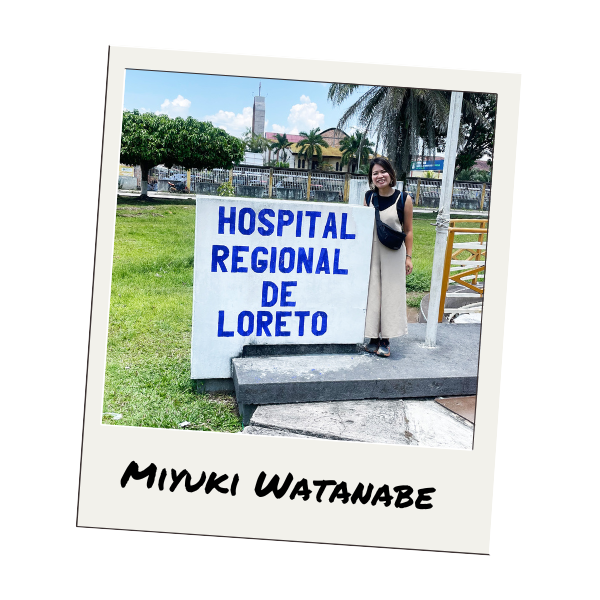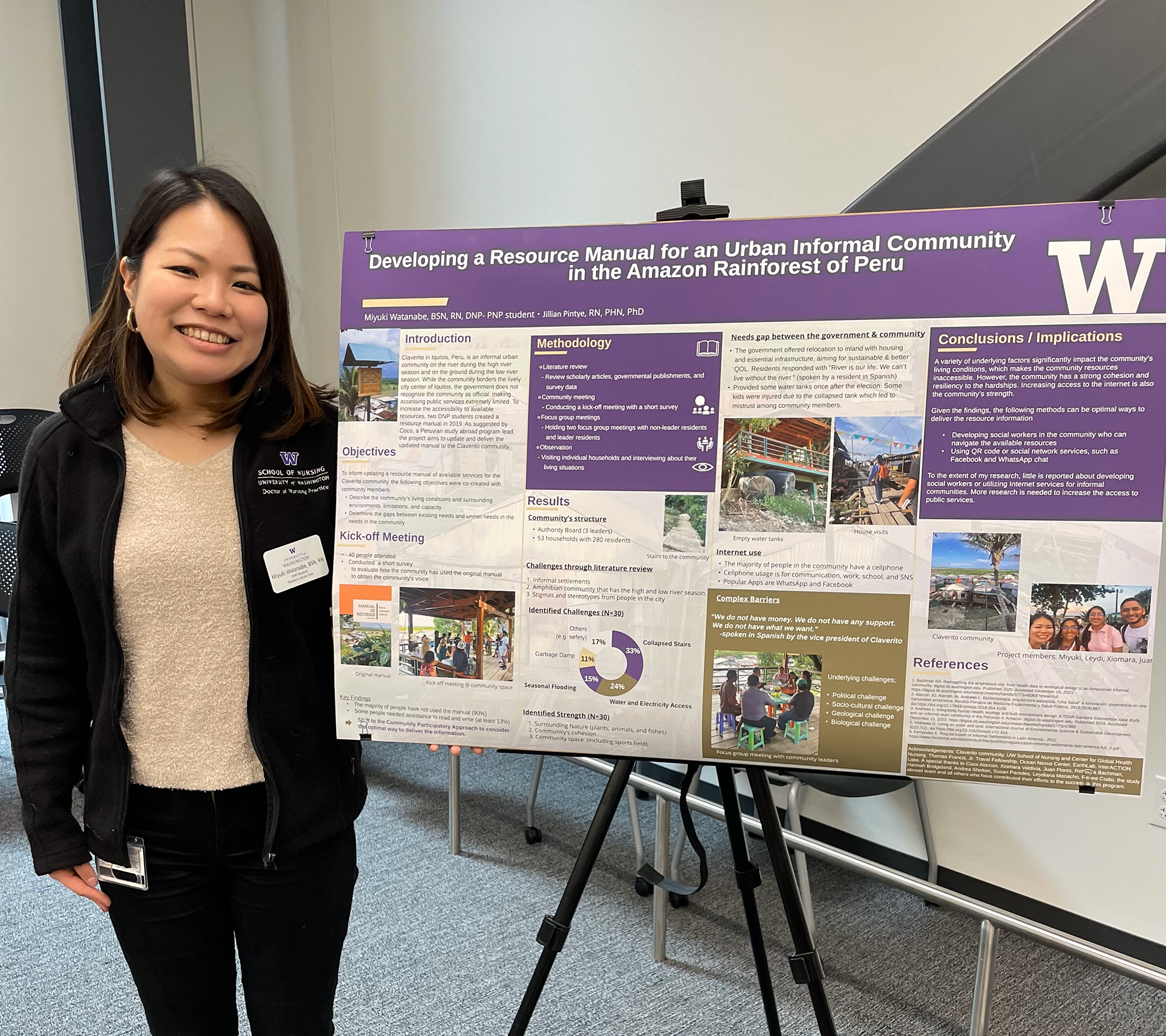Advancing global nursing leadership
With the support of the Sasakawa Health Foundation, University of Washington School of Nursing Doctor of Nursing Practice student Miyuki Watanabe (she/her) is on a transformative journey to redefine nursing leadership.
A transformative journey
From the bustling cities of Japan to the remote Amazon rainforest of Peru, Miyuki Watanabe (she/her) has embarked on a transformative journey to redefine nursing leadership. Through her studies in the University of Washington (UW) School of Nursing’s Doctor of Nursing Practice (DNP) program and her hands-on experiences in vastly different healthcare environments, Watanabe is forging a path to improve global health. Supported by the Sasakawa Health Foundation (SHF) and driven by a passion for change, she is learning to bridge cultural and systemic gaps to empower nurses and enhance patient care.

A remote Indigenous community in the Pacaya Samiria National Reserve, Iquitos, Peru, eight hours by both bus and boat from the nearest city.
United in Purpose
While working as a pediatric intensive care unit nurse in Tokyo, Watanabe noticed a significant gap in the healthcare system—nurses had minimal autonomy, often waiting for doctors to make decisions, which sometimes delayed critical care. This realization fueled her desire to advocate for the expansion of the nurse practitioner role in Japan, a mission she has embraced through her DNP studies at UW. Supported by the Sasakawa Health Foundation’s Nursing Fellow Program and Scholarship, Watanabe’s education has broadened her perspective and sparked her commitment to transformative change.
The Sasakawa Health Foundation (SHF), established in 1974 to eradicate Hansen’s disease, more commonly known as leprosy, has since expanded its mission to promote health and dignity for all. In recent years, it has focused on building capacity in home-care nursing and empowering Japanese nurses to drive societal change through programs like the Sasakawa Nursing Fellowship.
Fellowship participants attend top universities in the United States and Canada, including the UW School of Nursing, which ranks among the best in the world. Out of 430 applicants from 2021-23, only 30 fellows were selected, making Watanabe’s acceptance into this prestigious program a significant achievement.
Our partnership is built on mutual respect, shared values, and a deep commitment to making a difference in the lives of vulnerable populations.
Claverito, an informal urban community in Iquitos, Peru, where the project was conducted.
“The SHF has been a cornerstone in advancing global nursing leadership,” said Marla Salmon, UW School of Nursing professor of nursing and global health. “Our partnership is built on mutual respect, shared values, and a deep commitment to making a difference in the lives of vulnerable populations.”
Dr. Etsuko Kita, SHF chair, and Makiko Tanaka, chief program officer for the SHF Community Health Program, have been instrumental in shaping these collaborative efforts. “Their vision and dedication have been pivotal in driving the success of our fellowship program,” Salmon added.
The fellowship provides essential funding for international study, addressing financial barriers faced by many students in Japan, while also offering an educational support system. “The Sasakawa Fellowship not only provided me with financial support,” shared Watanabe, “but also connected me with a cohort of students and nurse mentors to learn from and gain practical experience.
A Global Perspective: Connecting Japan and Peru
In addition to pursuing her DNP through the fellowship, Watanabe expanded her understanding by completing a UW Certificate in Global Health Nursing. This journey took her from Japan to Peru’s Amazon rainforest, where she conducted a capstone project funded by the Thomas Francis, Jr. Travel Fellowship from the UW Department of Global Health.
Initially, Watanabe planned to distribute a resource guide to help the local community access social services. However, upon arrival, she realized that the project was not aligned with the community’s needs. The paper guide was impractical for a community built over a river, where many residents struggled with literacy and had more immediate concerns, like repairing flood damage.
“So, I changed my project,” Watanabe said. She shifted her focus to understanding the barriers that prevented people from accessing social services, recognizing that addressing the root causes of these issues was critical.
This experience in Peru reshaped her perspective on healthcare and nursing. Initially, she believed that expanding the scope of nurses was the key solution to rural health issues, a belief shaped by her experiences in Japan. While she still sees this as important, her time in Peru taught her that broader policy changes and a deeper understanding of local contexts are also necessary to improve healthcare access. “We have to address the underlying causes,” Watanabe noted.

Watanabe's final presentation at the Annual Global Health Nursing Celebration by the Center for Global Health Nursing, March 2024.
Watanabe’s first day of the trip in Fukue Island, Nagasaki, Japan, for Sasakawa’s home-care nursing experience.
Bridging Experiences: Applying Global Insights to Local Challenges
The SHF also organized a three-week trip to a small island town in western Japan, where Watanabe observed the challenges faced by Japan’s aging population, particularly in rural areas. “I saw many older adults living alone or older couples who are each other’s caregivers,” she said. This experience echoed the themes she encountered in Peru, reinforcing the importance of adapting healthcare solutions to the specific needs of each community.
Watanabe plans to further this exploration by completing some of her DNP clinical work in rural U.S. settings, applying the global insights she has gained. “Each healthcare system has its strengths and weaknesses,” Watanabe observed. “By studying successful practices from around the world, I can more effectively target areas for improvement.”
As she embarks on a new certificate in population health equity, Watanabe aims to deepen her ability to advocate for policy-level changes that will benefit vulnerable populations in both Japan and the U.S. Her journey through the DNP program, supported by SHF, has broadened her perspective and equipped her with the knowledge and skills needed to lead transformative change in nursing on a global scale.
"By studying successful practices from around the world, I can more effectively target areas for improvement."
Aerial view of the Amazon Rainforest in Peru.
Join Us in Shaping the Future of Global Nursing
Miyuki Watanabe’s journey is just one example of how the Sasakawa Health Foundation and the UW School of Nursing are working together to empower nurses and transform healthcare worldwide. Whether you’re a healthcare professional, educator, or advocate, your support can help expand these vital programs, foster international collaboration, and cultivate the next generation of nurse leaders.
Get involved today—support our mission to create a healthier, more equitable world by investing in nursing education and global health initiatives. Together, we can make a lasting impact on communities across the globe.
Support or learn more about the Sasakawa Health Foundation and the Sasakawa Nursing Fellow Program and Scholarship.
Learn more about the Thomas Francis, Jr. Travel Fellowship from the UW Department of Global Health and read about other student fellowships from various disciplines. The Department’s travel fellowships are funded through generous donations from private individuals and organizations and support from the Department of Global Health.
Follow the UW School of Nursing Voices of Nursing podcast to hear more about the future of nursing from nurse leaders, researchers, and scholars.
Co-written by Paige Bartlett and Jennifer Hunt
Edited by Jessica Bird